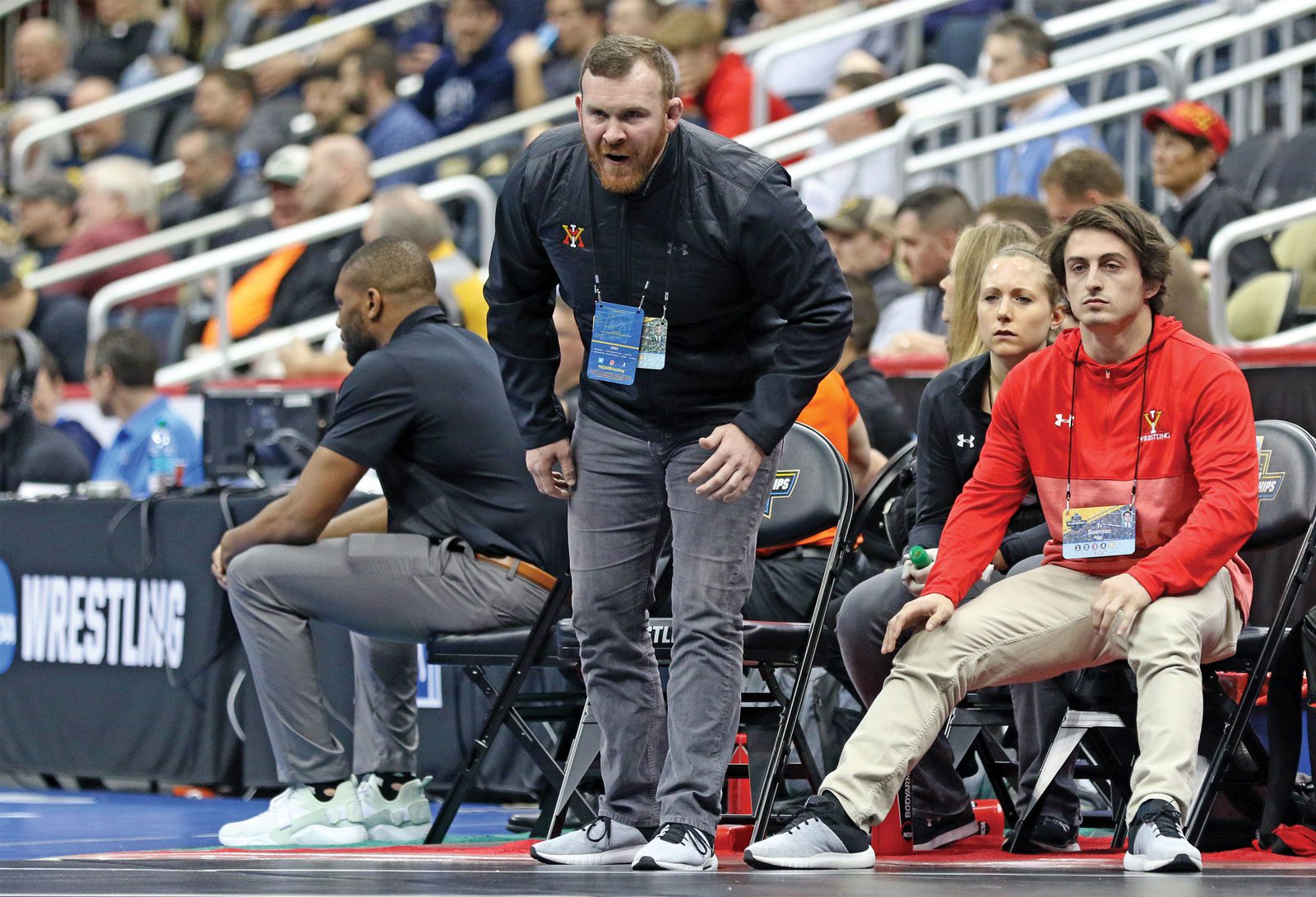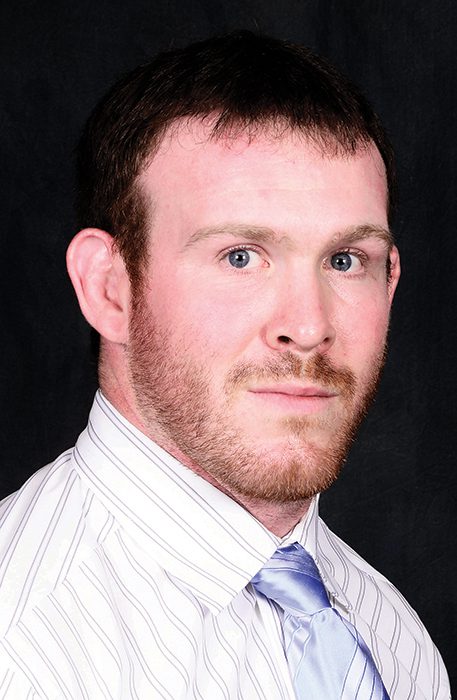Jim Gibson: Following Through

Jim Gibson and Ty Schofstall coaching Cadet Neal Richards '19 at the 2019 NCAA Division I Wrestling Tournament in March 2019.

Jim Gibson and Ty Schofstall coaching Cadet Neal Richards '19 at the 2019 NCAA Division I Wrestling Tournament in March 2019.
Head Keydet wrestling coach Jim Gibson wants to teach his wrestlers to overcome challenges and mentor them for the future, engage alumni and build a fan base. To accomplish these goals, he begins his to-do list with one simple verb: Winning.
“I’m a big believer in that winning helps,” he said. “When you win, things will take care of themselves.”
The truth of Gibson’s no-nonsense approach to the head coaching position was evident during the 2018-2019 wrestling season – his first at VMI – when the Keydet grapplers went 3-3 in the conference for the first time in 11 years and had the first Southern Conference champion since 2011 in Cadet Neal Richards ’19, then a red-shirt junior.
While Gibson, like any other coach, cannot guarantee success on a timeline, he has a pretty good formula. He and his assistant coaches put together a structured, intense training program, expect the team “buy in” and tell each wrestler to control the three things he can personally affect: Effort, attitude and toughness.
Effort goes almost without clarification, but should be “maximum” both on the mat and in the weight room. Toughness refers to the innate struggle intrinsic to the sport: Wrestling “is a physical contact sport. It’s essentially a combat sport,” he noted.
As for attitude, Gibson asks his wrestlers to show up at Cormack Hall with “a positive attitude every day,” he said, further explaining, “I’m not asking these guys to walk down here with this huge smile on their faces – but to not walk in here with bad body language.”
“[It] can be a challenge around here, especially that first semester when they’re being challenged in other areas.” If his athletes can control those three areas “to the best of their ability … it’s not a matter of if they succeed, it’s a matter of when they succeed,” Gibson said.

"You say you’re going to go to class, go to class. You say you’re going to do your homework, do your homework. You make a promise to somebody, you follow through with it.”
Jim Gibson Keydets Head Wrestling Coach
Every athlete is on a different personal timeline, determined in the nebulous space where physical conditioning meets mental resiliency. Some wrestlers show up to college, put forth a determined effort and “within a month, it clicks and they’re off and running,” but for other wrestlers the transition to Division I wrestling may take six months – or even two years.
“That’s tough, because [the wrestler is] going through some serious training and some really hard times” and might not see his “return on investment” for years. How each athlete acts during this time of “hard choices” and “ups and downs” is definitive, said Gisbon. “Do they point the finger, blame it on a coach, blame it on a teammate or a professor – or do they roll their sleeves up and lift their chin and climb out of that valley?”
Once Gibson sets a goal, he is completely committed to seeing that goal to its end state. He emphasizes follow-through to his athletes as well. “I try to talk to my guys about that, too,” Gibson said. “That’s not just wrestling and athletics. You say you’re going to go to class, go to class. You say you’re going to do your homework, do your homework. You make a promise to somebody, you follow through with it.”
Gibson had an early taste of following through on an individual level when – coming into his junior year – his high school dropped the wrestling program. Rather than transfer and lose a year of eligibility, Gibson opted to continue at the same school – as the sole member of the team. The coach, an older man, stayed on to guide Gibson – but was unable to act as the necessary sparring partner. “I mostly ended up wrestling with my dad,” he recalled. “I ended up placing in the Pennsylvania state tournament my junior year and did fairly well, so we decided to keep going with it.”
Gibson’s wrestling career continued at Edinboro University’s Division I program. While embarking on a coaching career following graduation, Gibson continued competing in senior level USA wrestling and qualified for the World Team Trials in 2009. He accepted the head coaching position at VMI in 2018.
Gibson’s experience includes small state institutions and a small, elite academic institution, making him a great fit for VMI. He understands the resources available at a state institution, while seeing the value of a “challenging academic atmosphere.”
For recruiting, “life after college” is paramount, Gibson said. VMI “fits my belief system, and fits my structure and my program and – ultimately – my feelings on what wrestling can do for you 15, 20, 30 years down the road.”
Although Gibson is personally all in for the VMI way of life, he wasn’t certain how that would translate when he was out recruiting. He was pleasantly surprised, however, at how receptive parents and recruits were to the Institute – especially when they learned pertinent statistics like “98% job placement” and “starting salary over $60,000” plus a low student-to-teacher ratio.
“Their eyes and ears kind of perk up a little bit. All these advantages that VMI offers, people consider it because of them,” Gibson said, noting that the Honor Code and VMI’s unique challenges are also attractive. “I think as a young man, and as the parents of a young man, why wouldn’t you want your son to be exposed to this? Being challenged, and being pushed is a good thing. Ultimately, you’re going to be a better person for it.”
Looking to the future, Gibson wants to continue building relationships with both the local community and with alumni. On the community front, he aims to help both generally – this past year, the team held a food drive and did heavy-duty yardwork at the Rockbridge SPCA – and specifically with area wrestling programs. That Gibson’s young son is beginning in youth sports is a factor, he noted, but went on to say that any effort he puts into local wrestling programs will eventually pay dividends on the mats at Cormack Hall. Keydet wrestling tested the waters by holding wrestling clubs for pre-K to high schoolers throughout the summer plus two more specific camps geared toward older wrestlers.
VMI has a great wrestling legacy, and Gibson is working to strengthen bonds with alumni. At the January match versus the University of Virginia, the team had an alumni event honoring Matt Erwin ’02, the latest Keydet wrestler to be inducted into the VMI Hall of Fame. The sport began at VMI in 1921, and over 100 Keydets have won conference championships. Teaching his wrestlers about that history will improve competitiveness. Bringing back successful alumni will instill in current wrestlers the firm foundation of Keydet athletic success – and keep wrestlers’ minds open to their own possibilities.
“It can be done. You can do it all at a high level. It just comes down to what you’re willing to sacrifice as an individual to make your dreams and your goals happen,” he said. “Not just athletically – but academically and beyond.”